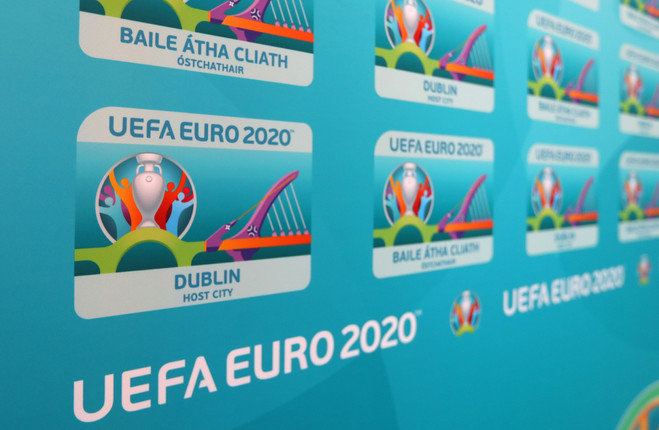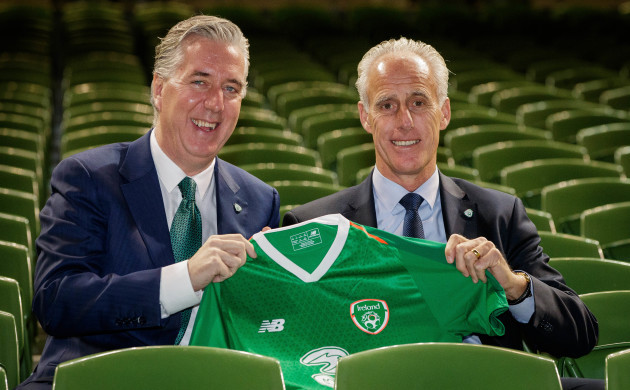IT WAS OUT with the old, in with the old for the FAI this week as Mick McCarthy returned to his former post after the departures of Martin O’Neill and Roy Keane.
16 years on from the end of his first spell, Mick will be tasked with restoring some much-needed confidence and structure in order to qualify the Republic of Ireland for Euro 2020, with newly-appointed U21s manager Stephen Kenny waiting in the wings to take over after the finals.
The magnitude of his task will become clearer on Sunday when the qualifying draw takes place at Dublin’s Convention Centre.
One of 12 cities hosting the tournament, Uefa delegates and representatives from all 55 member nations have arrived in the Irish capital to learn their fates, while a number of activities and events have been taking place this week — including the National Football Exhibition at Dublin Castle, which launched on Friday night.
The draw is scheduled to kick off at 11am, and you will be able to watch it live on RTÉ2, Virgin Media Sport, Sky Sports News and on Uefa’s website.
After a frankly disastrous Nations League campaign that saw Ireland relegated from League B, they will be placed in Pot 3.
Pots
Uefa Nations League pot: Switzerland*, Portugal*, Netherlands*, England*
Pot 1: Belgium, France, Spain, Italy, Croatia, Poland
Pot 2: Germany, Iceland, Bosnia-Herzegovina*, Ukraine*, Denmark*, Sweden*, Russia, Austria, Wales, Czech Republic
Pot 3: Slovakia, Turkey, Republic of Ireland, Northern Ireland, Scotland*, Norway*, Serbia*, Finland*, Bulgaria, Israel
Pot 4: Hungary, Romania, Greece, Albania, Montenegro, Cyprus, Estonia, Slovenia, Lithuania, Georgia*
Pot 5: Macedonia*, Kosovo*, Belarus*, Luxembourg, Armenia, Azerbaijan, Kazakhstan, Moldova, Gibraltar, Faroe Islands
Pot 6: Latvia, Liechtenstein, Andorra, Malta, San Marino
*Already ensured at least a play-off place after winning their Uefa Nations League group
The 55 entrants will be split into five groups of six and five groups of five, with the first round of qualifiers beginning between 21-23 March and running through to November.
Four nations who won groups in League A of the Nations League – Switzerland, Portugal, Netherlands, England — are to be drawn into the first positions of Groups A-D to ensure they have two dates free to play in the Nations League finals in June, with those in Pot 1 filling the first positions in the remaining groups.
Just to make things a little confusing, there are also a number of restrictions in relation to:
Host nations – To allow the 12 Euro 2020 hosts a chance of qualifying as group winner or runner-up, a maximum of two such teams can be drawn into one group.
Prohibited team clashes – Uefa’s Executive Committee has decided that the following nations cannot be drawn in the same group:
- Gibraltar/Spain
- Bosnia and Herzegovina/Kosovo
- Kosovo/Serbia
Winter venue restrictions – Uefa have identified a number of countries at risk of severe weather conditions, so a maximum of two of the following can be drawn in the same group:
- Belarus
- Estonia
- Faroe Islands
- Finland
- Iceland
- Latvia
- Lithuania
- Norway
- Russia
- Ukraine
In addition, three classed as ’hard winter venues’ (Faroe Island, Finland and Iceland) cannot host matches in March or November.
Excessive travel restrictions – Several nations have also been flagged for their long travel distance, so there are some restrictions on who Kazakhstan (Astana), Azerbaijan (Baku) and Iceland (Reykjavik) cane be grouped with in order to minimise travel burden.
Qualifying
The top two teams from each group will book their place at the Euro 2020 finals, with the other four slots filled by the Nations League play-offs to be played in March 2020.
Even if Ireland fail to do finish among the top two, they may still get another chance to qualify through the Nations League play-offs, despite finishing last in their group thanks to their ranking (explained in detail here).
The42‘s Paul Fennessy has also written about the best and worst case scenarios in terms of who Ireland can get in Sunday’s draw.
– A version of this article was first published on 1 December.
Subscribe to our new podcast, Heineken Rugby Weekly on The42, here:


